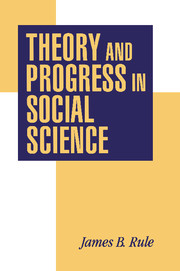8 - Theory for coping
Published online by Cambridge University Press: 05 November 2011
Summary
Strictly expressive criteria for the elaboration of social inquiry might suffice, were it not for the pervasive need to cope with the constraints of social life. The fact is, we do not form images of the social world only for our own satisfaction in the contemplation, but also as bases for dealing with social forces that impinge upon us, whether we recognize them or not.
Like expressive interests, interests in coping with social life take many forms. These range from individuals' needs to understand and anticipate the workings of their immediate social contexts to broadly shared interests in grasping and dealing with basic features of social life – for example, social stratification, political upheaval, or economic growth and stagnation.
What all these concerns have in common is their focus on forces that constrain experience. From individual needs to get along with associates at work or at home to broadly shared interests in responding to the changing social organization of technology or world economic change, people realize that life is subject to forces that bear on human interests, whether recognized as such or not. If we want to make the most of social life, we must develop theories offering guidance concerning such forces and constraints.
For consistent constructivists, of course, any notion that our analytical faculties might afford such guidance is simply a theoretically induced illusion.
- Type
- Chapter
- Information
- Theory and Progress in Social Science , pp. 203 - 225Publisher: Cambridge University PressPrint publication year: 1997

